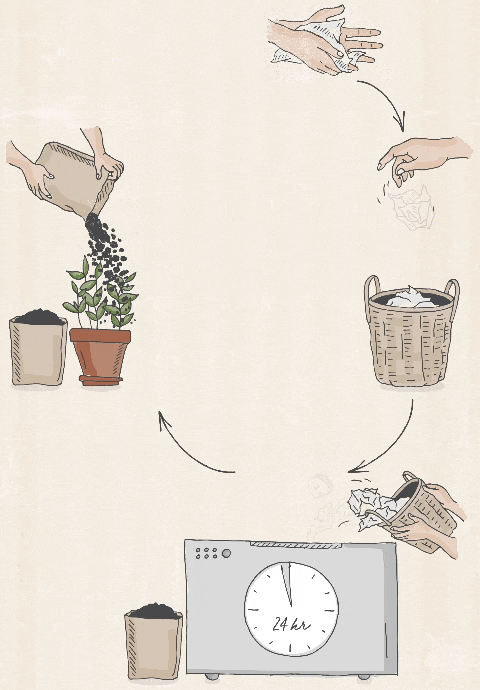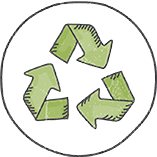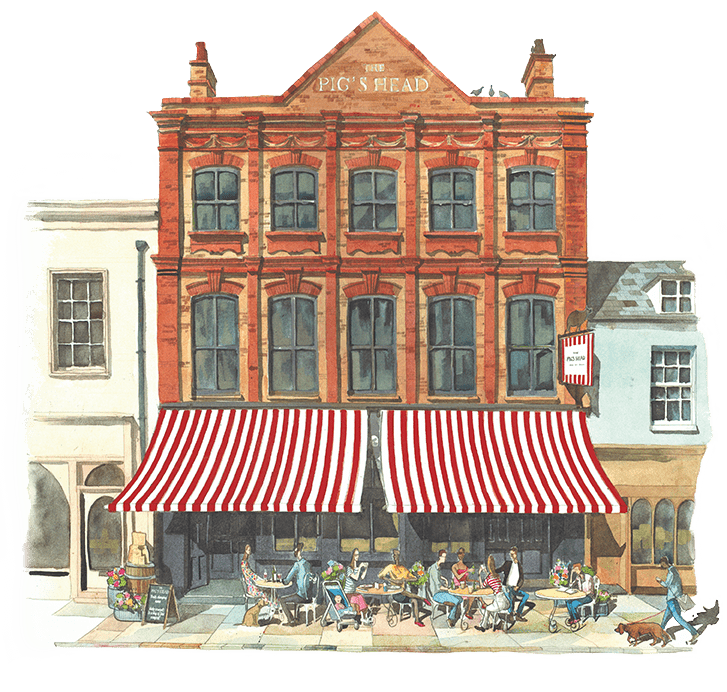Waste reduction
We have invested many months in the numerous initiatives we have implemented to limit our waste and reduce our consumption at the Pig’s Head. Here are the highlights of our efforts:
Food Waste
Our menu is crafted daily, enabling us to create dishes based on surplus ingredients in the kitchen.
We transform various products that would otherwise be disposed of into snacks, dishes, and garnishes. For example:
- Potato skins are repurposed into crisps and hash browns.
- Unused sourdough is transformed into crostini and breadcrumbs.
- Seasonal fruit and vegetables from our kitchen garden are pickled and fermented, ensuring year-round use (and stored in our dining room).
- Leftover stems and leaves are pickled to make Sauerkraut.
- Cauliflower stalks are puréed and mixed with cheddar to create the cheese sauce for our cauliflower cheese dish.
- Vegetable stems (such as Cavalo Nero) are puréed to make green sauce.
- Fortified and old white and rosé wines are used to make red vermouth.
- Our rhubarb daiquiri includes rum infused with rhubarb stems and rhubarb syrup made from the leftover poaching liquid of our rhubarb dessert.
- We create an oyster shell martini using gin infused with ground oyster shells.
To further monitor and manage food waste, we have a dedicated food bin for scraps from customers' plates. This practice enables us to track uneaten food returning to the kitchen and make necessary adjustments accordingly.
Compost
We invested in an on-site and very high-tech composter (affectionately named Doug the Destroyer by our opening team) to reduce food waste that would otherwise be sent for industrial composting.
The composter can handle up to 25kg of food and compostable waste daily. It results in an 80% to 90% reduction in waste (food waste is mostly water) and turns it into compost in 24 hours.
We process approximately 80kg of compostable waste per week, including food waste, paper, card, coffee and tea bags.
We offer this compost to our guests in ‘doggy bags’ and use what isn’t taken as a soil conditioner in our kitchen garden.

Paper Waste
Reusing washable cloths is better for the environment than using single-use disposable paper products like centre feed (commercial kitchen roll).
To reduce waste and promote reuse, we have implemented the following practices:
- We wash and reuse cloths and rags whenever possible, minimising the need for single-use items.
- Our use of microfibre cloths is paired with purchasing off-cuts and rags from our linen and laundry supplier, preventing these materials from being discarded.
- Centre feed is only used when necessary, particularly for effective sanitisation purposes.
Our current system of reusing cloths and rags wherever possible resulted in the average use of only 6 rolls of centre feed per week in our first 12 months of trading (we purchase 100% recycled centre feed from Serious Tissues).
We recognise that contemporary thinking into microplastic pollution and its effect on the environment is creating doubt into the previously held belief that reusing microfibre cloths is a more sustainable alternative to using disposable paper products. Although we haven't found scientific evidence on this subject, we are committed to researching and staying informed. If needed, we are open to adjusting our systems to ensure the most sustainable practices.
Glass Waste
Wine
Despite their endless recyclability, glass bottles have the highest carbon footprint of all beverage containers due to their significant weight. The carbon footprint of a glass bottle can vary depending on various factors, such as the manufacturing process, transportation, and disposal. The weight of a glass bottle is the significant contributing factor to CO2e emissions. Wine bottles are thicker and heavier than water bottles and, on average, have a higher carbon footprint.
With this in mind, we offer as many wines on tap as possible. Our wine list comprises over 80 bottles, and we offer six wines on tap. The wines on tap are sourced in 20-litre recyclable KeyKegs. A single KeyKeg replaces 27 glass bottles resulting in significantly less packaging, transport weight, transport emissions and glass waste.
The amount of CO2e saved is hard to determine. A study by Graziella Benedetto concluded that approximately 1.64kg of CO2e are emitted per 0.7L bottle of white Sardinian wine. A study by Luis Pinto da Silva and Joaquim C.G Esteves da Silva estimates that 56.71% of the emissions are due to bottling and, in particular, the production of the bottles.
KeyKegs calculate that 4.78kg of CO2e emissions are emitted during the production of a single KeyKeg. We conservatively estimate that nearly 0.5kg of CO2e are saved by serving 0.7L of wine from a KeyKeg vs a glass bottle (although this figure is likely closer to 0.75kg).
We purchased 2,180 litres of KeyKeg wine in our first 12 months of trading, an equivalent of 3,114 bottles.
Using this data, we conservatively believe we have saved at least 1.5 tonnes of CO2e by serving wine on tap.
Water
Rather than sell bottled mineral water, we sell bottomless still and sparkling filtered water for £1.50 per table. We then give the profits to Great Ormond Street Hospital Charity.
In our first 12 months of operation, we sold the equivalent of 4,459 litres of water.
A study on the Carbon Footprint of Beverage Packaging in the United Kingdom estimates that the production of glass bottles emits between 150-761kg CO2e per 1,000 litres. The study states, “A significant variation has been found in the carbon footprint for the same type of packaging material, mainly influenced by the size and weight of the containers and the recycling rates. The manufacture of raw materials and the packaging are the main hot spots for all packaging”. We have taken a midpoint of 456kg CO2e per 1,000 litres (lower than wine bottle production) for our calculations.
Based on this data, we have saved at least 2 tonnes of CO2e in our first 12 months by selling filtered water vs mineral water.
More importantly, we have donated over £21,000 to Great Ormond Street Hospital Charity to date.
Plastic Waste
Plastic is our biggest bugbear but also the hardest to quantify regarding waste reduction. When it comes to plastic, our ethos is ‘avoid, reuse, recycle’.
For example, vegetables will often be delivered in lightweight plastic trays. Rather than dispose of these trays, we ask our suppliers to collect and reuse them. The trays not picked up by our suppliers are used by us to transport vegetables from our kitchen garden in Kent (in an electric vehicle).
Duchess Farms, our rapeseed oil and flour provider, collect used 5-litre plastic containers from us when making deliveries. These containers are sterilised and reused by them.
We do not use cling film in the business. Instead, we invested in reusable tubs and lids.
We vacuum-pack and sous-vide (water bath) with plastic-free compostable bags that we dispose of in our composter when used.
Recycling
We spent a long time researching possible recycling partners to work with, and we were impressed by Quantum Waste due to their outstanding eco-credentials and recycling rates. Quantum boasts the industry’s lowest carbon footprint, making them a perfect fit for our sustainability goals.
We separate our waste into eight bins, and the Quantum team then manually sort everything to ensure as much waste is recycled as possible. This meticulous sorting process allows for a high recycling rate and guarantees that 0% of the waste collected by Quantum ends up in landfill.
 As a result, an impressive 81.4% of the waste collected by Quantum is recycled, and the remaining 18.6% is utilised for energy production through incineration.
As a result, an impressive 81.4% of the waste collected by Quantum is recycled, and the remaining 18.6% is utilised for energy production through incineration.
In comparison, the latest statistics on waste from the Department for Environmental Food & Rural Affairs (DEFRA) indicate that the recycling rate for Commercial and Industrial waste in 2018 was only 50.4%, and the recycling rate for household waste in 2021 was only 44.6%.
Our partnership with Quantum Waste has allowed us to far surpass the national average, reinforcing our commitment to responsible waste management and contributing to a cleaner environment.
Back to top


